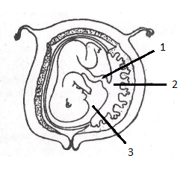The fertilized egg divides by the process of _____.
Important Questions on Reproductive System
Given below are diagrams showing the different stages in the process of fertilisation of an egg in the female reproductive tract:
Study the diagrams and answer the questions:

(i) Arrange the letters given below each diagram in a logical sequence to show the correct order in the process of fertilisation.
(ii) Where does fertilisation normally take place? What is ‘implantation’ that follows fertilisation?
(iii) Mention the chromosome number of the egg and zygote in humans.
(iv) Explain the term 'Gestation'. How long does gestation last in humans?
(v) Draw a neat labelled diagram of a mature human sperm.
The diagram given below is that of a developing human foetus.
Answer the questions that follow:

(i) Label the parts numbered 1 to 3 in the diagram.
(ii) Mention any two functions of the part labelled 2 in the diagram.
(iii) Explain the significance of part number 3 in the diagram.
(iv) Define the term ‘Gestation’. What is the normal gestational period of the developing embryo?
(v) Mention the sex chromosomes in a male and female embryo.
Given below are statements: one is labelled as Assertion A and the other is labelled as Reason R.
Assertion A: Endometrium is necessary for implantation of blastocyst.
Reason R: In the absence of fertilization, the corpus luteum degenerates that causes disintegration of endometrium.
In the light of the above statements, choose the correct answer from the options given below:
Choose the correct answer from the four options given below:
The fusion of the sperm and ovum is termed as:
Give biological explanations for the following:
The placenta is an important structure for the development of a foetus.
Correct and rewrite the statements by changing the biological term that is underlined in the statement:
The protective sac which develops around the developing embryo is called the Pericardium.
Name the following:
The structure which connects the placenta and the foetus.
Give appropriate biological or technical terms for the following:
The fluid that surrounds the foetus.
Mention the exact location of the following
Amniotic fluid
Comment upon the following:
A single sperm fertilizes an ovum, still, more than 300 million sperms are present in each ejaculation.
Comment upon the following:
Blood of mother and foetus never mix with each other, but there is always some barrier between the two.
Name the following:
The duration between the fertilization and child birth.

